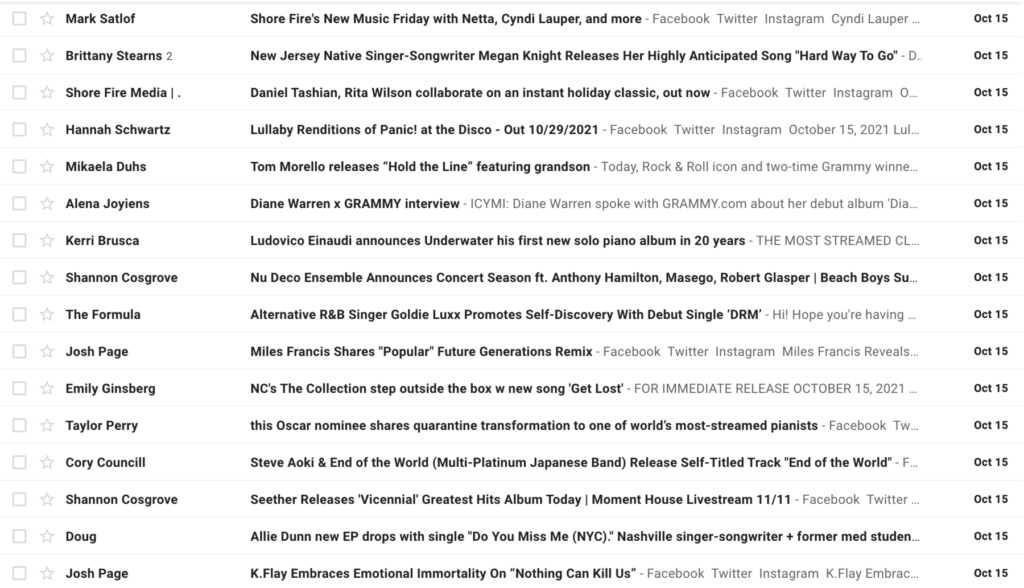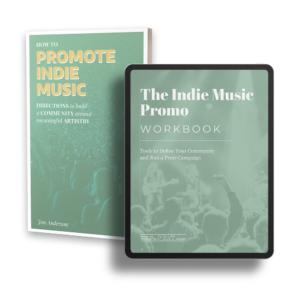Today, I want to give you a look behind-the-scenes at my life as the founder and Bad-Emailer-in-Chief of a mid-level indie music blog.
You’ll probably find this a little depressing.
With personal email filtered out, here’s a picture of my inbox at around 2pm this past Friday:

That image might be a little blurry (I think you can click on it to blow it up), but you probably get the idea. By 2pm, I’d been asked to cover a weird gamut of artists ranging from Steve Aoki to Diane Warren.
And that was just from the PR firms that emailed me directly (slash have me on their blast list).
That same day, five indie artists submitted to Two Story Melody via the contact form on the website. I have those filtered to come to a separate folder in my email, and I review it once every few days.
And also on the same day, we had exactly 33 songs sent to us for review on SubmitHub. So, yeah…
That means that, altogether, we had 54 coverage requests to review on October 15th.
Our managing editor, Joe, processed a decent chunk of these (Joe is the best). I personally reviewed and responded to one (I am the worst).
54 requests is on the high-side of an average day for us (it’s New Music Friday, after all). Generally, we’re getting 300+ coverage requests per week.
Five rapid-fire thoughts on this:
1. It’s basically a full-time job to legitimately review every request for coverage.
And most indie music bloggers aren’t doing this full-time.
(We don’t have anyone full-time at Two Story Melody, although that’ll be changing November 1st 😀)
2. Follow-ups work.
When people circle back with me multiple times, it triggers my natural tendency to feel guilty and I’m much more likely to respond. Feel free to take advantage of this.
3. If you submit your music somewhere and you get ghosted / rejected, it doesn’t mean your music sucks.
If you send a track somewhere and you don’t hear back, there’s a decent chance that nobody even listened to it. Your problem is probably that your pitch didn’t catch the eye of the part-time music blogger frantically scrambling to catch up on their email.
And on that note…
4. It’s really important to craft pitches that stand out.
Obviously, this begs the question: How can you stand out?
My advice: The best way to stand out is to be Steve Aoki.
The second-best way is to establish a relationship with the people you pitch to.
I’m fairly ashamed to tell you this, but I literally did “Select All -> Delete” to all of the emails in the image up there. (Most of them were copy/paste press releases sent to hundreds of other music outlets, so I didn’t feel too awful – but still.)
The one email submission I did respond to on Friday was from a previous client. I’d worked with him a couple of years ago on a press campaign, and he reached out with his new single. I saw his name and immediately wanted to respond because I know him.
And the third-best way to stand out is to create a compelling story.
Usually, this means you take a unique angle (like the one above: “this Oscar nominee shares quarantine transformation to one of the world’s most-streamed pianists” – random enough to be intriguing).
Or, you have a major piece of street cred that inherently makes your story interesting (i.e., you were covered by GRAMMY.com).
5. If you can’t stand out (yet), you should submit to places where you don’t have to.
Here’s the truth: Most artists 1) aren’t Steve Aoki, 2) don’t personally know people at the place they’re pitching to, and 3) haven’t been featured in super-legit places like Rolling Stone or GRAMMY.com.
If that’s you, that’s okay. Everyone starts from the bottom.
But you should know that you probably won’t get covered in your dream outlet to start.
You will have a far better chance at getting covered in newer outlets (what I call “bedroom blogs” – places where founders/editors do all the work themselves and are still excited to get submissions).
Once you get covered, you will have a relationship with the outlet. And you can use this level of coverage to build your credibility.
Over time, you’ll have more relationships and more street cred, and getting coverage will come more easily. Like I’ve said before, it’s a snowball.
That’s all I’ve got for this week.
Now it’s back to processing my inbox ha.
I hope this was more helpful than depressing. The truth is that it’s not easy to get your music heard – but that doesn’t mean it’s not worth it.
Don’t give up. You’ve got this.

